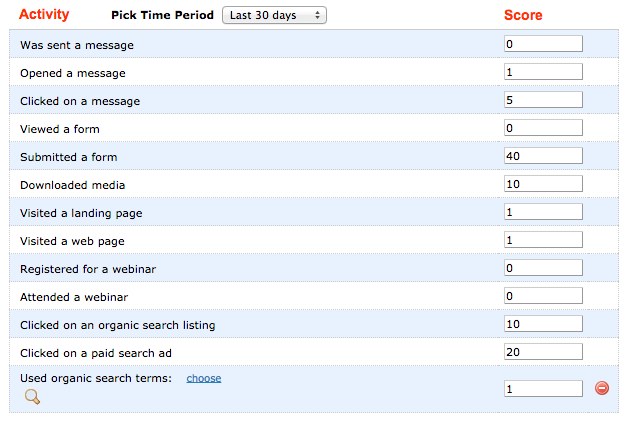What is Lead Scoring?
While I often say that most marketing is fundamental, you cannot deny that technology has created some interesting new approaches that the every marketer should take a hard look at. Lead scoring and lead nurturing are at the top of that list for me.
Lead scoring is the methodology of applying a dynamic score to contacts that signifies the perceived value or likelihood of that customer buying. Using a scoring system across a high number of leads allows your salespeople to decide who to contact as well as helping your marketing department make data-driven decisions.

Who should you mail expensive product samples to? Which leads should your salespeople call first? Who can you invite to your next promotional party event at the big industry tradeshow? All of these decisions can be made much easier when you have a large database of contacts with a shared scoring system.
How is a score calculated?
There is no one way to score leads. You, the marketer, get to decide how to score leads and you will certainly want to refine that approach over time. Make sure to get feedback from the sales team once you have some data on how to improve the scoring system.
The goal is to identify leads that are both qualified and engaged. Qualification might be gauged based on company size, role, industry, annual income, age or neighborhood—this is highly dependent on your target market. Engagement scoring is where technology really plays a role, and what I will focus on in this article.
If you believe that an engaged prospect is a good use of your salespeople’s time, then it is important to identify your most-engaged prospects and assign them to a salesperson. This is the most common example of how companies use lead scoring.
At Juicy Results, we use Act-On to score leads, but there are many others. Below is an example of a lead scoring formula we use for a campaign aimed at marketing directors of professional services companies. The number on the right is how many points are added to their score each time they complete the corresponding activity (all leads start at zero).

In our customer relationship management database (CRM), each lead has a score, and a detailed history of their engagement. You can imagine how powerful this is for the salespeople.
How to use lead scoring
Let’s continue using the example campaign from above. Through data services, pay-per-click marketing, display advertising and natural SEO, we have built a database of several thousand marketing directors who may be a fit for our services within this campaign. There are several articles, blog posts, webinars and other useful assets being offered to these leads.
Over time, we are not only educating these potential customers through marketing automation, but we are actually scoring their engagement. Any one of these leads may call in at any time to learn about our services, but at some point many of these leads reach a certain score—let’s call it 100 points—at which point they will be assigned to the sales team.
This use of lead scoring and lead nurturing accomplishes the following:
- Provides the sales team with a steady stream of educated, qualified leads.
- Allows salespeople to spend their time with most engaged, and even most ready-to-buy prospects.
- Creates hot leads from otherwise non-buyers through education and multiple touchpoints.
- Gives salespeople detailed intel on what the prospect is focused on and already knows.
Advanced Lead Scoring Patterns
In addition to this example, you can use even more specific scoring activities such as which google search term brought the lead to your website, how many pages they view within one session and even if a specific sequence of web pages are read that might exhibit a buying signal.
Some of the marketing automation platforms will allow your salespeople to set alarms or notifications when certain behaviors are met. Imagine if you are working with a prospect who has an open proposal or is in a holding pattern. An example of a useful notification would be a text message if this particular prospect visits the pricing page, or opens the proposal (which contains tracking code to facilitate this).
A well timed follow up call just might be the difference in closing that deal.
. . .
Technology, specifically marketing automation technology, is allowing companies to scale their personalized marketing and sales efforts to new levels. And, in recent years, this technology has become more available and accessible to small and medium sized businesses.
I hope this article has got you thinking about how to scale your marketing and use lead scoring to better prioritize your salespeople’s time. If you would like to learn more about this technology, please see our Marketing Automation Agency service page.








Patrick Hartoonian
November 2, 2014 at 4:25 pm
Lead Scoring: An intuitive process in evaluating how “strong” a lead is.
Using this method, businesses can spend more time efficiently on leads that are more likely to make a purchase.
Very nice piece here, Jeremy.